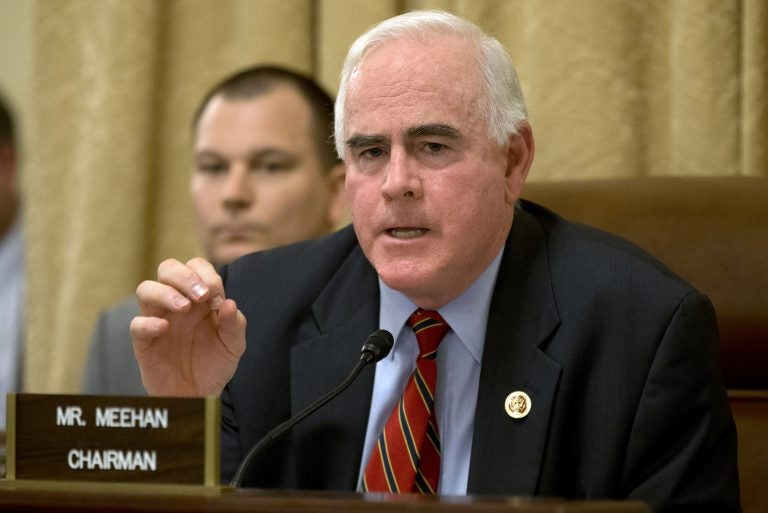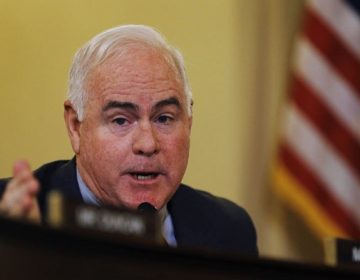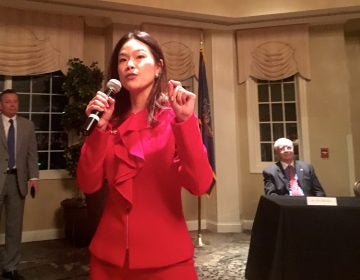Listen to U.S. Rep. Pat Meehan explain his sexual harassment case
We post my awkward interview with Pat Meehan about his sexual harassment case.
Listen 9:17
FILE - In this March 20, 2013, file photo, Rep. Patrick Meehan, R-Pa. speaks on Capitol Hill in Washington. (AP Photo/Jacquelyn Martin, File)
Delaware County U.S. Rep. Pat Meehan is trying to go where no man has gone before — explaining his way out of a sexual harassment complaint in the #MeToo era.
In an extraordinary series of interviews with reporters Tuesday, Meehan sought to explain his relationship with a young woman from his congressional staff, who he said he has “deep affection for,” even considered a “soul mate,” but didn’t pursue romantically.
You can hear my awkward conversation with Meehan by clicking the play button above. The written transcript can be read in full below.
The New York Times has reported that, in a complaint to the U.S. House Office of Compliance, the woman said Meehan expressed romantic feelings in a conversation and a handwritten letter after she became involved with a man, then grew hostile when she didn’t reciprocate. You can read the letter below.
The complaint was settled with a monetary payment and a confidentiality agreement.
It’s almost painful to hear Meehan say that he had deep affection and regard for the woman, and that it was emotionally difficult for him when she developed a serious relationship with someone else, but that he wasn’t jealous, though at times he “struggled with” his feelings for her.
He also released the handwritten letter in which he congratulates her on the new relationship, and some text messages which seem to show a friendly relationship with her.
But it’s hard to square his account with the fact that the woman felt so aggrieved that she hired a lawyer and filed a formal complaint. You can hear his response when I asked for his take on that. He said he was “deeply disappointed.”
Meehan says he’s running for re-election, and thinks when voters hear all the facts they’ll conclude he didn’t sexually harass anyone.
We’ll see where this leads, but given the history of these things so far, it’s hard to see how he gets beyond the fact that a harassment complaint was settled with a monetary payment and a confidentiality clause negotiated by lawyers.
Meehan, by the way, said he regards the payment not as a settlement, but as severance for a long-term employee who was leaving his office.
Alexis Ronickher, the attorney for the complainant, hasn’t responded in detail to Meehan’s account, saying her client wants to preserve her privacy, and accusing Meehan of a “gross breach” of the confidentiality provisions of the settlement.
Ronickher said the woman will cooperate with the House Ethics Committee investigation into the matter.
Read the full interview transcript.
Editor’s note: This interview has been lightly edited for clarity.
What was the relationship with this young woman?
I had a very close working relationship from somebody who was a consummate professional that I watched grow from a young age, working on the staff, to a person who had really become one of the best performers on the Hill in the position that she had.
And did you at any point express romantic interest?
Not romantic interest. I expressed to her, in the context of a conversation that I had that has been referenced in The New York Times, that I had an affection for her. But I clarified, beforehand, that I was a happily married man. I was not looking for any kind of a relationship. That when I expressed those sentiments, it was in the context of where I admitted that it was something that from time to time I struggled with, and it was set in the context so that she would understand as we worked together why, from time to time, I might be a little more distant. Because I was making sure that I was always working on never going across that professional line.
It sounds as if it was difficult and, tell me if I’m wrong, that you were jealous that you’d had this relationship. Would that be a mischaracterization?
Absolutely. And if you look at the letter, it’s written to identify that, not only am I happy that she has this relationship, but I am saying, ‘Go for it.’ It had nothing to do with our own personal relationship, because as I’ve stated before, I would not have been seeking. I have one love relationship in my life that I’ve been loyal to for the 30 years we’ve been together. I’ve never once strayed from that, and I had no interest in doing that in this case either.
So why was it emotionally difficult for you? That’s what I don’t quite get here.
Well, sure it’s emotionally difficult when you are discussing with a person who has been with you for so many years, that she was ready to move away from that relationship we had for eight years working together. And that’s a loss, and that’s emotionally difficult.
If one has a close friendship, and then there’s a relationship [with someone else], can’t the two coexist?
Yes, they can. And I think this is what happened. They did coexist. And I’ve been upfront with the idea that, while we worked together, there was a growing affection that I wanted to make sure — that I struggled with — to make sure that I would never cross that line. I believe that I was invited to be able to communicate about that. There were questions about whether there was something going on the daily basis that she ought to know about, or that was different in the way we were engaging, and I thought that it was an opportunity and an important one for us to — for me — to be able to talk about that with her so that we would be able to sort of regage that in a way in which we’d be comfortable working together.
I guess it goes without saying you never touched her in a romantic way obviously right?
No, I never touched her. I never expressed any interest in doing so. I never asked for any kind of a relationship … I mean, you know, we would, with some routine, you know, exchange hugs. And that’s a unique thing with her.
But nothing that you would consider romantic, right?
No.
What do you make of the fact that she filed this complaint? How do you square that with the interactions you had?
I’m extremely disappointed, first, because I wasn’t able to communicate to her in a way which I believed she had taken it, and understood, and in effect was communicating back to me, ‘Thank you for letting me in.’ And it was consistent with what she had said to me: ‘Trust me. Let me, lean in.’
So it came out of the blue that she had filed this complaint?
Hey, Dave. I think I misspoke and I hope we have the kind of professional relationship where you will [trails off]. I said that she is the only person that I hugged. I don’t want to suggest that in any way shape or form. I mean, you know, there will be others as well. I don’t think that I’m a, you know, a routinely huggy guy, but when I said that we would hug, the first person that I would see when I came down from D.C., and the last person that I would see when I would leave D.C., on a regular basis, was this person that I was working with. We’d talk about the week, and it was not uncommon that I’d give her a hug.
I think the critical thing is the nature of it and if it was friendly, that’s a different matter. So this sort of came out of the blue. Would you describe yourself as a soul mate, or is that how you felt with her?
Let me describe the term ‘soul mate.’ And I can only tell you what it meant to me. And it related to the kind of kindred spirit that was going through the experiences that we shared together ,and in my job, as with all colleagues like this, you know, there are highs, there are lows, there’s excitement, there’s all kinds of things that you deal with in terms of the pressures of the day. And here was the very person that was at the center of all of that. It was more than a gatekeeper. It was the person who really determines how and when and who got through to me — and oftentimes when and how I was going to get back to somebody else. And we shared an awful lot in that, a lot of humor. She expressed a lot of grace under pressure. I always appreciated that. And I think that, having gone through the wars over a number of years, that’s a kindred spirit. And that’s precisely what I meant by that term.
This is obviously a lot more personal information than one would normally share. Why are you going into this kind of detail in this circumstance?
Because I’ve got people making accusations that somehow I have acted in a sexually harassing way. And I think if people see the nature of the communication, they will appreciate that it was intended as an invited conversation with somebody that I believed would have been able to have that. And the last thing in the world that I would have engaged in is sexual harassment. I want to speak to the people the 7th Congressional District and let them know that that was neither my motive to act that way nor is it consistent with who I am.
I understand you refer to the payment as a severance and not a settlement, right?
Yes.
And I understand that there were confidentiality provisions in whatever agreement was reached. Do you think what you’re releasing and talking about now is consistent with the confidentiality provisions?
I have been advised by attorneys and the confidentiality agreement was broken by counsel for the young woman previously. And by virtue of that, it opens the door for my ability to defend myself in this environment.
The council broke that by speaking to The New York Times, or in what fashion?
By the reaction to our request for a removal from the confidentiality agreement. There were numerous statements made in media across the country that not only characterize the nature of the case in violation of the agreement, that characterized my actions and intentions in a disparaging way, and that were a violation directly of their responsibilities under the agreement.
You do intend to remain a candidate for re-election?
I’m a candidate for re-election.
Is there anything that I didn’t ask you that you want to make sure I understand here?
No, I think you’ve got it.
WHYY is your source for fact-based, in-depth journalism and information. As a nonprofit organization, we rely on financial support from readers like you. Please give today.





